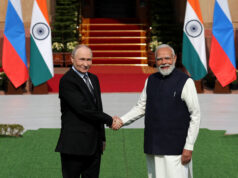“This particular Pak Saudi defence pact transforms an informal security relationship into a binding treaty, which we can compare to NATO’s Article Five,” says Ausaf Sayeed, India’s former ambassador to Saudi Arabia. “Article 5 states that any aggression against either country shall be considered an aggression against both.”
In other words, the defence agreement signed earlier this month between Saudi Arabia and Pakistan is a significant upgrade on the relationship they have had since the 1960s, which has included stationing a Pakistani army contingent on Saudi soil.
But Ambassador Sayeed underscored that “the agreement does not explicitly extend Pakistan’s nuclear umbrella to Saudi Arabia. However, it creates sufficient ambiguity to allow for multiple interpretations.”
So the official Pakistani version is that nuclear weapons are not on the radar and the pact focuses on conventional defence cooperation. But contradictory statements are coming from both sides to create deliberate ambiguity, suggesting that there is a possible, open interpretation for nuclear cooperation.
It helps Saudi Arabia build the perception of nuclear protection minus any formal Pakistani commitments, while it helps the latter avoid any violation of non-proliferation norms and also ensure its India-centric posture is not diluted.
Ambassador Sayeed believes the agreement also heightens the risk for Pakistan in that it may now figure in the Israeli cross-hairs.
“Pakistan maintains that its nuclear doctrine is India-specific,” Ausaf Sayeed notes, “but the explicit extension of the nuclear capabilities to Saudi Arabia under this mutual defense agreement creates unprecedented complications for Israel’s strategic planning.”
As for India, there is a risk here of the “India-Pak hyphenation” getting new life, something South Block would be keen to avoid. The agreement also introduces complex new dynamics in India’s relationship with the larger Gulf region.
“In any future India-Pakistan military confrontation, we must factor in whether that would involve the potentially involved Saudis or not. And then also it will complicate India’s response calculations to Pakistani-sponsored terrorism.”
It will be a testing time for India’s relationship with the Saudis, but given India’s strong economic and energy links with the kingdom, investments flowing both ways, and the fact that Delhi (along with China) remains a huge energy market.
Tune in for more in this conversation with Ausaf Sayeed, former ambassador to Saudi Arabia.
Thirty eight years in journalism, widely travelled, history buff with a preference for Old Monk Rum. Current interest/focus spans China, Technology and Trade. Recent reads: Steven Colls Directorate S and Alexander Frater's Chasing the Monsoon. Netflix/Prime video junkie. Loves animal videos on Facebook. Reluctant tweeter.




